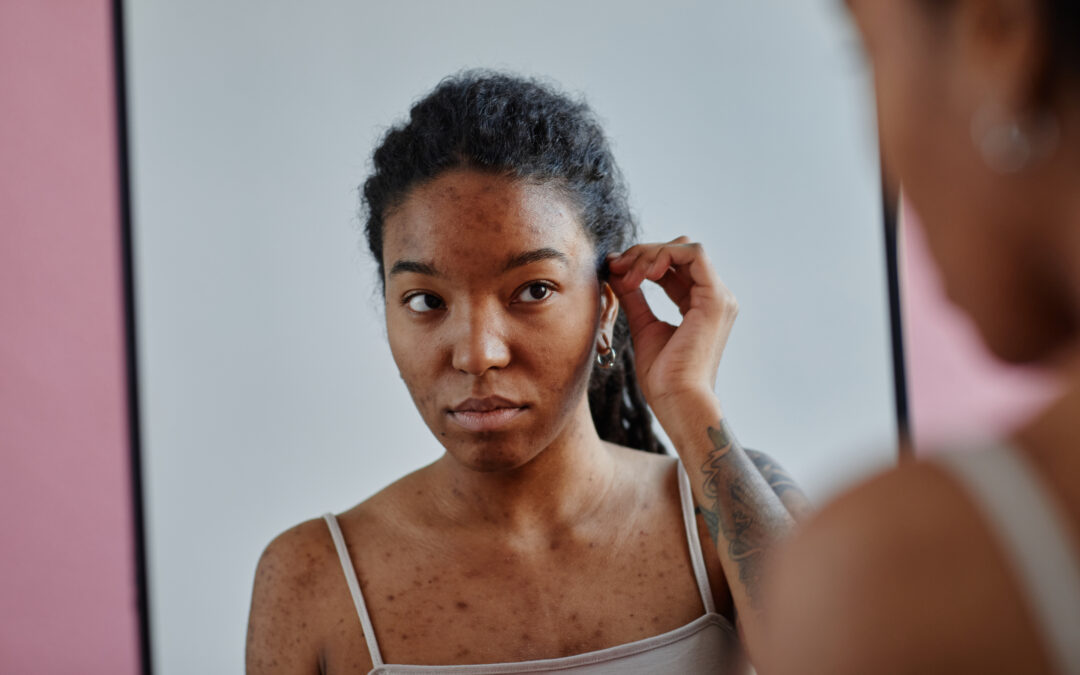Today, we’re diving into an important topic that affects many of us: disordered eating. It often sits on a spectrum between normal eating and an eating disorder, encompassing a range of symptoms and behaviors. Disordered eating behaviors often resemble those found in eating disorders, but they usually occur with a lower frequency or lesser severity.
In this blog post, we’ll explore this gray area together and provide you with practical tips and a supportive approach to help you overcome these behaviors with confidence and compassion. We’ll also explore the concept of Health At Every Size (HAES) and the difference between body neutrality and body acceptance. Let’s dive in!

Table of Contents
What are Disordered Eating Behaviors?
Let’s shed light on what disordered eating behaviors truly mean. These behaviors encompass a range of irregular eating patterns and attitudes towards food that can have detrimental effects on your physical and mental well-being. While not classified as clinically diagnosed eating disorders, they still deserve attention and care. Here are some examples of disordered eating behaviors:1
- Frequent dieting, anxiety associated with specific foods or meal skipping
- Chronic weight fluctuations
- Rigid rituals and routines surrounding food and exercise
- Feelings of guilt and shame associated with eating
- Preoccupation with food, weight and body image that negatively impacts quality of life
- A feeling of loss of control around food, including compulsive eating habits
- Using exercise, food restriction, fasting or purging to “make up for bad foods” consumed
Tips for Managing Disordered Eating Behaviors
The management of disordered eating behaviors highly depends on the types of behaviors you have. Remember that everyone’s recovery journey is unique and that there is no one-size-fits-all approach to healing your relationship with food and your body. With that being said, let’s explore some general tips to help you manage and overcome disordered eating behaviors:
Tip 1: Practice mindful eating and intuitive eating when possible
Mindful eating and intuitive eating are powerful approaches that can help transform your relationship with food. Mindful eating involves being fully present and aware of the experience of eating. It’s about paying attention to the flavors, textures, and sensations of each bite, as well as recognizing your body’s hunger and fullness cues. By practicing mindful eating, you can foster a more balanced and satisfying relationship with food.
Intuitive eating, which is similar to mindful eating, also encourages you to listen to your body and honor its signals. It involves trusting your inner wisdom to guide your food choices based on what feels nourishing and satisfying to you. It’s a framework created by two dietitians Evelyn Tribole and Elyse Resch, based on their work in eating disorder recovery. There are 10 principles of intuitive eating centered around rejecting the dieting mentality, making peace with food, discovering joyful movement, etc. You can learn more about these principles here. When appropriate, try implementing the principles of intuitive eating in your life.
To practice mindful and intuitive eating, it’s essential to be mindful of your eating habits and patterns. Notice if you have any behaviors that may be detrimental to your relationship with food, such as restrictive dieting, skipping meals, or feelings of guilt or shame associated with eating certain foods. Being aware of these patterns allows you to make conscious choices and work towards developing healthier habits.
Tip 2: Work on body image
Body image is a vital aspect of our relationship with food and ourselves. It’s important to understand concepts like Health At Every Size (HAES), body neutrality, and body acceptance:
Health at Every Size (HAES) is an approach to health that emphasizes a neutral stance towards weight.2 It recognizes that a person’s health, risk level, and overall quality of life cannot be accurately determined solely based on their weight or body size. The traditional belief that body weight is directly and consistently linked to improved well-being and reduced disease risk is challenged by this perspective. It’s important to note that HAES doesn’t imply that every individual in every body is currently in a state of optimal health. Instead, it acknowledges that every person has the potential to pursue health and engage in behaviors that promote their well-being, regardless of their body size or shape.2
Body neutrality advocates for eliminating physical appearance as a part of a person’s self-worth. This means focusing more on how you feel in your body and what it can do, rather than how it looks at any given time. Additionally, it means that your body image doesn’t significantly impact your mood or behavior. It is the belief that we can care for our bodies even if we don’t always view them positively.
Body acceptance means that you don’t have to be thrilled with your body every minute of every day. It’s more about finding a way to genuinely accept and appreciate it. This can be especially helpful for those in recovery, as it takes away the pressure for people to feel like they have to love the body that they’re in, which can feel overwhelming. Body acceptance is about taking a closer look at why you feel negatively towards your body and finding peace with it without feeling the need to change it.
Working on body image involves challenging negative beliefs and societal pressures. It includes practicing self-compassion, engaging in positive self-talk, surrounding yourself with body-positive influences, and seeking support from therapists or counselors who specialize in body image and self-esteem.
Tip 3: Don’t be afraid to ask for help!
When dealing with disordered eating behaviors, reaching out for support is crucial. There are various professionals who are equipped to help individuals with eating disorders and disordered eating, such as:
Doctors: Medical professionals can provide physical evaluations, monitor health concerns, and offer guidance on the medical implications of disordered eating.
Therapists/Counselors: Mental health professionals specializing in eating disorders can help address the underlying emotional and psychological factors contributing to disordered eating behaviors. They provide therapeutic interventions, such as cognitive-behavioral therapy (CBT), to promote healing and recovery.
Registered Dietitians: As nutrition experts, a Registered Dietitian can offer you personalized nutrition counseling and guidance to establish a balanced and nourishing approach to food. They focus on helping individuals make peace with food and their bodies, challenge negative beliefs, establish a nourishing eating pattern, etc!
Remember, asking for help is a sign of strength, not weakness! Seeking support from these professionals can empower you on your journey toward healing and recovery.
Bottom Line

Managing disordered eating behaviors is a process that requires patience, self-compassion, and a supportive environment. By practicing mindful and intuitive eating, working on body image, and reaching out for professional help, you can embark on a path towards a healthier relationship with food and yourself.
If you’re ready to get started on your journey towards disordered eating/eating disorder recovery, we invite you to apply to work with us here. Regardless of the severity of your symptoms, your struggles are valid and you deserve care!
References:
- What is disordered eating? Eatright.org. Retrieved June 12, 2023, from https://www.eatright.org/health/health-conditions/eating-disorders/what-is-disordered-eating
- Ashline, L. (2021, April 16). Health at Every size® (HAES) 101. Body Liberation for All! Body Positive Stock and Client Photography + More | Seattle; Lindley Ashline. https://bodyliberationphotos.com/health-at-every-size-haes-101/






0 Comments